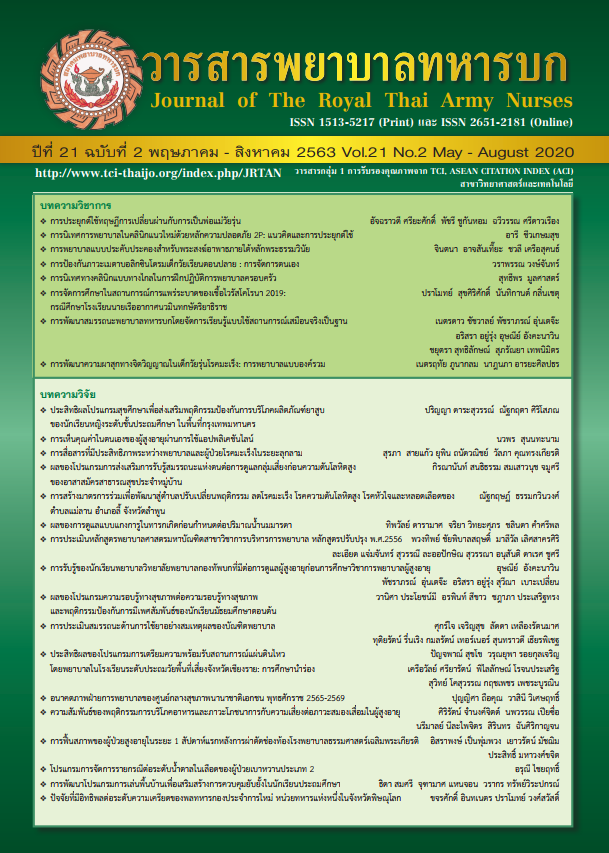Palliative care nursing for Buddhist Monk illness following dharma discipline (Tripitaka)
Keywords:
Palliative care nursing for Buddhist Monk illness, dharma discipline (Tripitaka)Abstract
Palliative care is a special care for each patient that it is not specific formula in each nursing care. The nurses who care patients need to use the skill both in art and science by using integrations of western medicine and alternative medicine. Moreover, the nurses should consider in faith, hope, believe, life history and context of patient and family for appropriate of each patient that depend on the right or living will to choose when the end of life is coming. Palliative care nursing for Buddhist Monk illness following dharma discipline (Tripitaka) is an importance. If the monks have illness in the incurable disease and the perception of monks depend on the period of time to be the monk life, when they get sick and they need palliative care with the condition of no relative support, so it is an important role of nurses in caring following the right in welfare of monk patient.
Hence, palliative care with the monk context following the dharma discipline (Tripitaka) has the meaning and it has an important to increase quality of life of the illness of the monks especially in psychological aspect in dharma practice following the wish of monk. That leads to set the nursing activities of good palliative care for the monks.
Downloads
References
WHO. WHO Definition of Palliative Care. The Health Assembly annually in Geneva, Switzerland.2005.
Lerdsaguansinchai P, Nuchprayul I, Chatkeaw P, and Sithipun C. Caring in end of life. Auksornsumpun. Bangkok. 2009. (In Thai).
European Association for Palliative Care, WHO. 2018
Priest hospital Medical department, ministry of public health. Clinical practice guideline for the monk patients. 2nd edition. Bangkok Art qualify. 2017. (In Thai).
Karunruk palliative care center, Khonkaen university. Basic Palliative Care for District hospital Team. 2015.
Office of the Royal Society. Dharma discipline. 3rd edition, Office of the Royal Society. 2009;392.
Phornsub Techakuljareon. The nursing practice guideline for the monk illness of the priest hospital. 2017. (In Thai).
Narayanasamy A. The puzzle of spirituality for nursing. A guide to practical assessment. Br J Nurs. 2004; 13(19): 1140-1144.
Hermann, C.P. Spiritual needs of dying patients: A qualitative study. Oncology Nursing Forum.2001;28 (1):67 – 72.
Suvarnabhumi k, Sowanna N, Jiraniramai S, Jaturapatporn D, Kanitsap N, Soorapanth C, Thanaghumtorn K, Limratana N. Palliative Care: Research and Treatment.2013; 7: 25-29.
Paul J. Moon. Grief and Palliative Care: Mutuality. Palliative Care: Research and Treatment.2013;7 :19-24.12.Thai Association for the Study of Pain. Clinical practice guideline for pain cancer. National Health Security Office. 2013. (In Thai).
Artsanthia J. Palliative Care in community with the Buddhism traditions. Journal of the Royal Thai Army Nurses. 2013; 14 (1) :123-27. (in Thai).
Nilmanut K. End of life care. Chanmeangkanpim Bangkok. 2012. (In Thai).
Jamjan L. & Chaleoykitti S. Trend of Palliative Care in the Bachelor of Nursing Science Curriculum. Journal of The Royal Thai Army Nurses. 2017; 18(1): 22-28. (In Thai).
Downloads
Published
How to Cite
Issue
Section
License
บทความหรือข้อคิดเห็นใดใดที่ปรากฏในวารสารพยาบาลทหารบกเป็นวรรณกรรมของผู้เขียน ซึ่งบรรณาธิการหรือสมาคมพยาบาลทหารบก ไม่จำเป็นต้องเห็นด้วย
บทความที่ได้รับการตีพิมพ์เป็นลิขสิทธิ์ของวารสารพยาบาลทหารบก
The ideas and opinions expressed in the Journal of The Royal Thai Army Nurses are those of the authors and not necessarily those
of the editor or Royal Thai Army Nurses Association.






